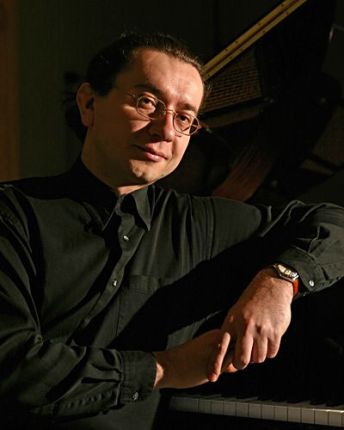Genadi Zagor at the Bohemian Cavern
By Stephen Brookes • The Washington Post • September 23, 2011
The PostClassical Ensemble never met a musical convention it didn’t want to smash, which is why its concerts tend to be the most adventurous in town. It wasn’t too surprising, then, that the ensemble abandoned its usual classical venues Thursday night for the dim and hobbit-scaled Bohemian Cavern, a jazz club in the 11th Street corridor, to present the quintessentially American music of George Gershwin — as interpreted by a classically trained Russian pianist who oozes Rachmaninoff from every pore.
 Genadi ZagorIt was a bit of a reprise for Genadi Zagor, who last September wowed audiences at the Clarice Smith Performing Arts Center at the University of Maryland with a lush, big-boned account of Gershwin’s “Rhapsody in Blue.”
Genadi ZagorIt was a bit of a reprise for Genadi Zagor, who last September wowed audiences at the Clarice Smith Performing Arts Center at the University of Maryland with a lush, big-boned account of Gershwin’s “Rhapsody in Blue.”
But Thursday’s solo setting allowed Zagor to improvise expansively — and much more intimately — on some of the composer’s best-known music, including the iconic “Rhapsody” itself. And Zagor’s take on this music is intriguing: Gershwin filtered through last-gasp Romanticism.
This was not some radically postmodern take on Gershwin — as, say, his countryman Alfred Schnittke might have done — but an unabashedly heartfelt homage that looked to the past rather than the future. That’s not meant as criticism; Zagor speaks Gershwin fluently, and his thoughtful, extended improvisations on the “Three Preludes” were genuinely moving, while his earth-shaking transcription of “Rhapsody” was spectacular and far more detailed than last year’s full-orchestra performance.
For better or worse, though, these were very much “classical” improvisations: virtuosic, seamless, beautifully constructed but also rather safe, lacking the edge and excitement of a genuinely risk-taking jazz performance. Zagor is a hugely gifted musician who has Gershwin in his blood; it would be fascinating to hear him push out the boundaries of this music with more daring, and reinvent it for our 21st century ears.


Reader Comments